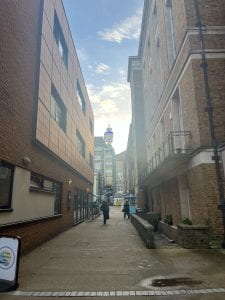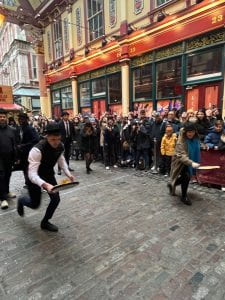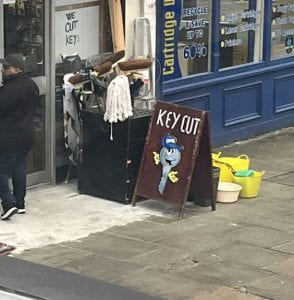by flesherc | Apr 9, 2024 | Uncategorized
Classes are over now, shockingly fast might I say. I don’t think anyone fully explained how UCL structures its terms back when I was applying, or if anyone did, I just didn’t believe them. So if you are someone scrolling through this blog looking for actual information about what’s going on over here, look no further (that being said, you do have to look a little further, at least to the bottom of this page, so you can finish reading this post). Term 1 was the fall semester equivalent so it is irrelevant for my purposes. Moving right along, Term 2 is from January to the end of March where there are 10 weeks of standard programming with a reading week halfway through intended for midterm prep. Then there is Easter break for around a week before the start of Term 3. Now it depends on which department you are in, but as far as I can tell, this is largely a fake term. Term 3 runs from the end of April to June, and it seems to be solely dedicated to final assessments. For STEM-y people that includes in-person exams, but for some humanities schmuck like me (no offense, none taken) it just determines essay deadlines. I have 3 essays due at the end of April, and then my UCL responsibilities are at an end. So yes, there really are only 10 weeks of class.
Unlike Whitman, departments here are incredibly siloed. Individual departments do things differently, and people largely take classes solely from their own department. Although this is not something I’m generally in favor of given that from the age of 5 onwards everyone around me has only sung the praises of interdisciplinary education, at a school the size of UCL it does mean that certain faces become familiar between multiple classes and everyone shares similar points of references. I took 3 classes with the School of European Languages, Culture, and Society (SELCS), a department that encompasses a good chunk of language learning classes but also has a whole slew of other more tangentially related classes. The UCL catalog has an overwhelming number of classes, but that is limited by the department you enroll in and by the fact that not all classes are open to affiliates. In my mind, the three classes I took in the SELCS department were essentially more specific English classes. One was about detective fiction, one focused on utopian and dystopian literature, and one was more broadly about the portrayal of conflict in writing. My fourth class was an art history class focusing on queer narratives in modern and contemporary art in London. This class was meant for people outside the department and took place at a different London museum each week. The art class ended up being mostly other Americans studying abroad while the others mostly included UCL students and occasionally international study abroad students. The 3 SELCS classes each had an hour-long lecture with everyone in the class and then an hour-long seminar (with at most 15 people) every week, but the art class was simply a 2-hour site visit. In general, the classes felt similar to Whitman’s aside from the separation between lecture and seminar.
Each class I took was solely assessed by the 2 essays. The UK education system apparently doesn’t penalize lack of participation in the same way I am used to, and that does affect the way people engage with the class. Nobody ever talks in lectures anyway (the only sound they make is the furious clacking of keys), but in the seminars there is definitely a different attitude toward participation. That is not to say that nobody participates, but some people will talk, and some won’t. It’s all about the essays. All the lectures, readings (meant to be read before the seminars), and seminars are in aid of giving you the background necessary to write the paper. Assessments are submitted anonymously and passed through the department’s professor and an external examiner. And, in an amusing move, the grading system here starts each score at a 0 and you earn points instead of the American attitude of starting with 100% and getting deducted. So if you crawl your way up to a 70 from a 0, you get an A. Well done.
So to get to the proverbial meat of it, yes, there are differences in the academic culture, but not in a way that provides much of an obstacle. Of course, I can’t speak for another department, but the actual academic tasks asked of the students boil down to the same things we have always been asked to do at Whitman. Ok, you can stop looking any further now.

Approaching Campus

Walking on Campus

Writing an essay on the main portico steps
by flesherc | Mar 9, 2024 | Uncategorized
Leap Day was a while ago now, but as far as Leap Days go, I’d say we’re still in the ballpark. They’re only every 4 years, after all. Even the Olympics are more often than that. (Provided you respect winter as much as summer, which I obviously do.) But I love Leap Day. I really like that the math didn’t work out, and the solution was just to chuck another day into February every so often. It’s a bonus day that isn’t really bonus.
To explain the title of this post, I must share one of my practices for a happy life. I have a system of eating crackers or really anything packaged with a bag in a box. In the first few units, I nonchalantly slip one outside the bag into the box and promptly tell myself to forget what I’ve done. Then, when I get to the end of the bag, and I’m sad all the crackers are gone, I go, “Hmm, sometimes a rogue cracker slips between the bag and the box. Let me see if it’s my lucky day.” And lo and behold, it’s a bonus cracker, all the tastier because it’s bonus. I know the cynics amongst you might say, “Oh, there’s no way you actually forget what you have done yourself moments ago,” but to that, I say, “You don’t know me.”
And that’s Leap Day. An artificial bonus day that is sweeter than a normal one simply because it’s bonus.
This year, my thoughts naturally turned to the last one. It just so happens that you can really cover some distance between Leap Days. 4 years ago, I was in high school in Minnesota (pre-pandemic, mind you), and here we are at university in London. Last time, I actively celebrated Leap Day, which was an endeavor involving a park, a grill, the discovery of a severed unicorn pinata head, and bowling. This year, I didn’t do anything out of the ordinary to celebrate. I did a few readings for my classes, walked in the rain to Lidl (the cheapest and, therefore, best grocery store), made tuna pasta salad, and took the bus to my 2 Thursday seminars. It was a day I have come to regard as normal and routine after 2 months of being here. But it was Leap Day, so I went through the routine with a particular zest that I normally reserve for bonus crackers.
So, on this day, I especially enjoyed things like walking in the rain and guessing how high each passing vehicle could make the water spray. The buses made quite the splash (pun very much intended). At Lidl, I enthusiastically threw myself into the chaos that envelops the self-checkout system by early afternoon. On my way to class, I consciously relished listening to an audiobook as I watched the streets from the top deck of the bus. (I’m delighted to report that Audible has predictably come crawling back to offer me yet another 3-month free trial.) In the afternoon, I reveled in the adrenaline sport of rushing to my second seminar and making it to the room exactly on the hour. When I made dinner, I thought, “What the heck,” and threw an extra olive into my tuna pasta. Actually, I guess I lied when I said I didn’t do anything out of the ordinary to celebrate. I had forgotten about the olive when I wrote that. So yeah, thanks to Leap Day, that’s a pretty great day. But like I said at the start, Leap Day is the best because you can’t help but feel like you’re enjoying an unpromised cracker. And when you stop and think about it, none of the crackers are guaranteed. Forget about living like it’s Christmas every day; Leap Day is the way to go.

UCL Main Campus

Staircase in UCL Physics Building

Inside a foggy bus. I took this picture to document how the screws connecting the poles to the chairs look like eyes.
In the spirit of bonuses, here is some bonus holiday content: On Pancake Day, I went to Leadenhall Market (the inspiration for Harry Potter‘s own Diagon Alley) to watch a pancake-flipping relay race. Teams of 4 must run 20 meters and flip their pancake a minimum of 3 times before passing the pan off to their teammate. The bowler hats are compulsory. Before the race started, I was engaged in a miming exchange with a confused waitress in the fancy Italian eatery on the second floor above all the action. I never thought I’d have to mime running and flipping a pancake, but I also never thought I’d watch people do that either. The dad of the family standing next to me joined a team at the last minute, and since I’d talked to them before the race, I was happy to have someone to cheer on. I picked the right team to root for because they only went and won the whole shebang.


by flesherc | Jan 28, 2024 | Uncategorized
There is one question I return to more than any other. I first asked it of myself almost four years ago, and I am still as fascinated by it now as I was then. That question is: At what point does a cow become beef? I’ve thought about it a lot, and I still do not know. I could write a series of blog posts about this one question, but unfortunately, that is not why we’re here. I only bring it up because the crux of the question lies in the problem of transitioning identities. When does one thing become another?
Nearly everyone in the English-speaking world probably knows the phrase “stranger danger.” Of course, I understand the need for the general sentiment behind the phrase, and even I cannot deny the pithiness of it, but just because it rhymes does not mean we must all abide by it. For instance, snoozing does not always lead to losing. In fact, being well-rested is known to make you a more capable person, thus making snoozing more of an aid to success than a hindrance. And if you found yourself in a napping competition (we’ve all been there), you snooze, you win. So I guess my point is don’t trust a rhyme to teach you how to live your life.
But the phrase does not hold up under scrutiny. Everyone you know was a stranger at some point. So either we’re all adrenaline junkies, or it really isn’t always that dangerous. The stereotype of London is that people don’t want to talk to you, but I have not found that to be the case.
Here is a selection of stranger interactions in chronological order:
- A man on the plane from Iceland to London. We talked for quite a while. He was from the Caribbean but lived in London for over 30 years. When I told him about studying abroad in London, he kept saying that it was a vibrant city and that I would have a good time. We laughed about the flight tracker saying we were flying south over West Africa.
- A woman in the tube station waiting for the lift. She was wearing an awesome blue velvet cape with silver embroidered stars. After I complimented it, she said she’d just been to the theater to see David Tennant in Macbeth. She got rush tickets for cheap, something I’ll have to make sure to do at some point. We then briefly discussed Hamlet before she told me how some tube stations only have lifts and no escalators because in London you can’t always dig through that much ground because of what has been buried. You can’t dig through graves. This information was prompted, by the way. She didn’t just bring it up out of nowhere.
- A young woman on the bus who I started talking to because we both hit our heads in the same way. I live a bit away from campus, so I take the bus, which I prefer to the tube. The tube is very convenient and easy to use, but I can’t help but feel like I’m the check in the drive-through bank deposit system where you get shoved into a cylinder and rocketed all over the place. On the bus, I can perch on the upper deck and watch the people on the street. The bus is also cheaper. But on the lower deck of the busses near the back, you must go up a step to get to the seat. It is configured in a way that is impossible to maneuver quickly without hitting your head. So we were talking about that. It turned out she also goes to UCL, which we discussed before moving on to diving into the topic of cheap groceries.
- Another UCL student on the bus was talking to me about nepo babies and where to buy ramen.
- A support officer who works at SOAS University. The campus is right by UCL, and this woman started talking to me about the weather since it was the first warmer day. Then we talked about me being from Minnesota, and she was asking me about the winters. She must think about the cold a lot. She wished me all the best, and moments later, her seat on the bench was replaced by…
- A SOAS student. We started by talking about food, and then we got talking about jazz, SOAS, and the UK. He was telling me about cultural amnesia in Birmingham.
None of these interactions led anywhere, nor were they meant to, but that doesn’t mean they weren’t appreciated. The places you go are colored by the people you meet, and you don’t have to learn their names to remember them. And sometimes you do learn their names, and sometimes you even meet them again, until it seems ridiculous to call them a stranger. I would need a lot more time to mention all the people who were strangers earlier this month who I now simply think of as people I know. When did that happen? At the risk of sounding like I’m insulting everyone I’ve ever met, when did the cows become beef?

One of the many characters spotted from my perch in the bus.

The best I can do in terms of perching in the tube.










